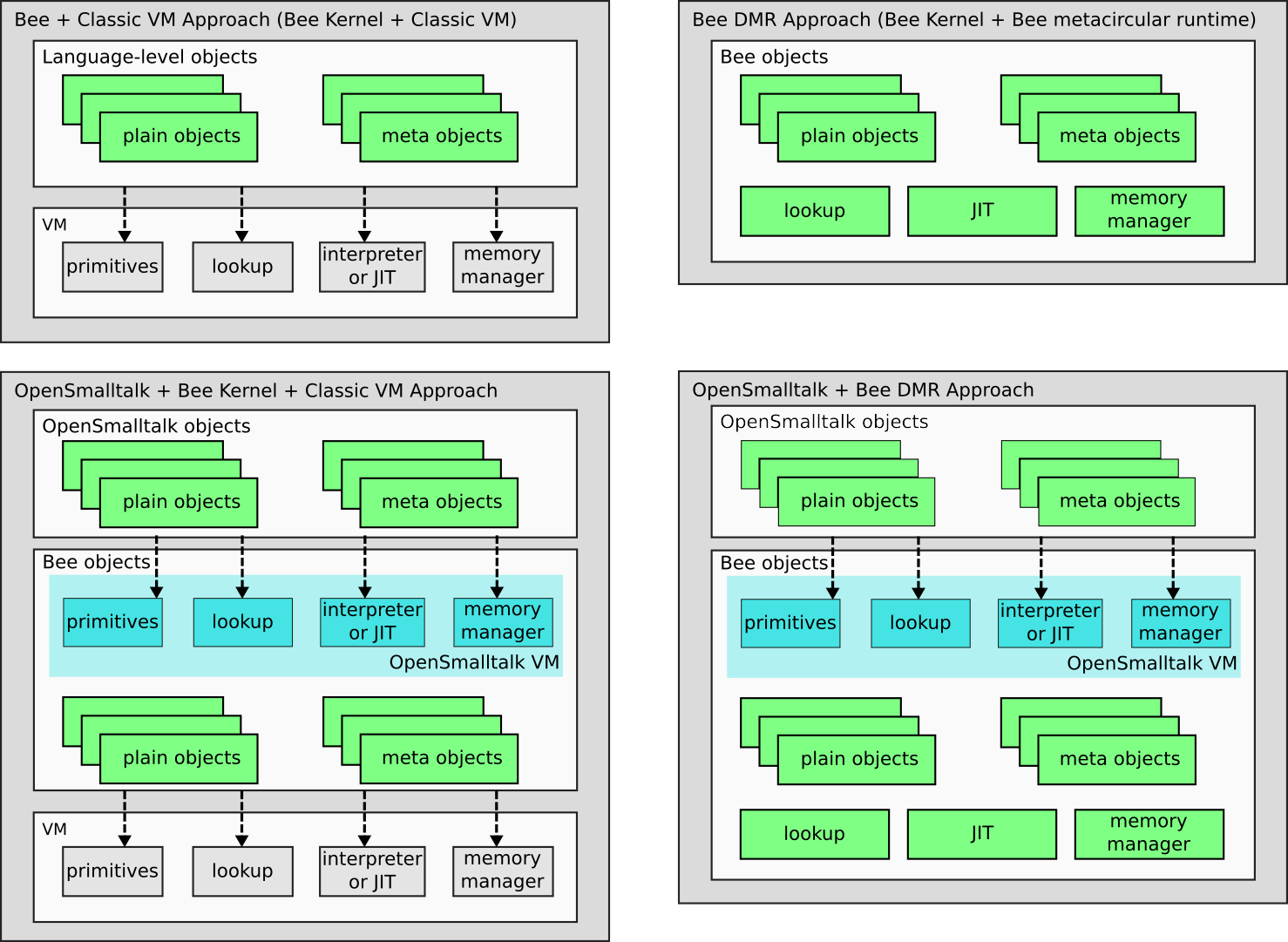Welcome to Powerlang’s documentation!¶
Powerlang is a research vehicle to explore the implementation of programming laguages. While focused on Smalltalk, it aims to be a generic language creation toolkit, something you can use to either evolve Smalltalk, or either build a new language implementation of choice. We provide tools for coding, bootstrapping, compiling, jitting and debugging the implementation.
Bee Smalltalk serves as a reference implementation using the framework. We are implementing an evolution of the classic Smalltalk-80. Something adapted to the new kinds of systems that are common these days: from embedded to servers, with or without a gui, supporting remote development from scratch.
Design¶
Below is our humble vision of what a modern Smalltalk design should look like, the direction in which we want to go.
We want a minimal modular Smalltalk, that starts from a little kernel and that can load other modules on-the-fly to grow exactly as needed. The bootstrap process is done mostly from a specification (source code), using different dialects (Pharo et al). This allows sealed-system development which is required when doing big or complex changes, specially in design. Of course, the live environment development will be supported as usual in Smalltalk-80 systems. Computation is represented using Smalltalk Expressions (or SExpressions), a lower-level representation of abstract syntax trees (ASTs) that is encoded into byte arrays (called astcodes).
Namespaces are supported from the beginning, and form the base of packages. Packages are built into (binary) image segments that load very quickly. A package distribution system computes dependencies and fetches prebuilt image segments for quick setup, update and deployment.
The base system can be used to allow creation of different dynamic languages. In particular, we expect Bee Smalltalk to expand on two different axes: on one hand, it can grow to become a full, tightly integrated Smalltalk; on the other hand, its kernel can be the base system on top of which we support other Smalltalks (or other languages). The main candidate for the latter approach is to make the opensmalltalk-vm run on top of Bee kernel, instead of translating it to C and compiling. This would make Squeak/Pharo/Cuis run on top of Bee, which could either run self-hosted (if using the DMR) or on top of another VM (like the OMR). Below we present a look of different possible mixes and matches of language environments and hosting runtimes.

Implementation¶
Powerlang-based systems should work on Windows, Linux, Mac, Android and nopsys, including embedded platforms. 64 and 32 bit architectures are the starting point, but if possible we may try even smaller.
At least two runtimes are being developed in parallel. The pure DMR (dynamic metacircular runtime), and the Eclipse OMR. The DMR is an AOT-based approach, that uses Smalltalk to pre-nativize a Smalltalk JIT compiler, and then uses that compiler to nativize on the fly other Smalltalk code. The OMR is a state-of-the-art C++ runtime engine, that includes plugabble interpreters, JIT-compilers and garbage collectors, which can be used to support languages like Smalltalk.
Smalltalk source code is stored on git, using a tonel-like format. We store just code and definitions in the repo, no artifacts. Build artifacts go through Continuous Integration from the very beginning. Each OS platform is put in a separate namespace and built into separate image segments, which are autoloaded according at startup according to the running platform. The system can be debugged remotely through a vdb/gdb connection, which allows both local and remote debugging.
Setup¶
To setup the development repository, see the instructions in Powerlang repo.
How to improve this documentation¶
This documentation was written in rst format and html output was generated by sphinx. You will find these same contents in /docs directory. To be able to compile them, you will need to install sphinx in your system:
pip3 install sphinx sphinx-autobuild
then just from root powerlang dir do:
sphinx-autobuild docs docs/_build/html
which will open a local http server at http://127.0.0.1:8000 that recompiles automatically when files are changed and that lets you browser the docs as you change them. When you have any change, just open a PR in github.com/powerlang
Indices and tables¶
Things to do (PRs are welcome!)¶
Todo
add a couple of examples of usage of registers in native code
Todo
add an example picture of the stack